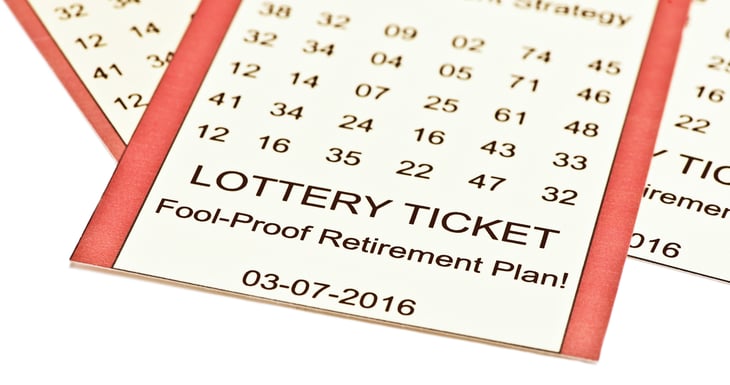
Editor’s Note: This story originally appeared on NewRetirement.
We have a lot of choices about where to invest our money, both before and after retirement. Some options are clearly bad investments. Others seem like a good bet, but they probably aren’t. While we would all like to find a shortcut to massive wealth, a more steady approach is probably the best route to a secure retirement. Save early and regularly, and invest surely.
You may know someone who has a friend who won the lottery, bought a Picasso at a garage sale or who invested on the ground floor in an amazingly successful company. However, those stories are the exception, not the rule.
The following advice came to us from Mr. Henry K. “Bud” Hebeler, a legendary retirement guru who developed his own special methods and gave numerous seminars on retirement until his death in 2017.
Hebeler learned a lot of bad investment lessons from both his own and his associates’ experiences, and he put together a list of 13 truly “unlucky” investments that you should avoid. The following common sense advice is in Bud’s own words.
For more, read “28 Retirement Investing Tips from Today’s Financial Geniuses.”
1. Livestock and commodities: There’s no ‘moo’ in money

When I was a kid, my father had a bad experience with an investment to raise animals. He told me frequently, “Don’t invest in anything that eats.” One of my business associates told me his worst experience was investing in cattle, and he said he wished he had heard my father’s words.
I took my father’s advice when I was approached by a friend who had a great sales pitch. He wanted some seed money for a catfish farm. His fish and the farm went belly-up, one in the water and the other in bankruptcy.
Another business associate got involved with options trading and speculated in eggs. He was at the end of the chain of trades and ended up with a boxcar full of eggs that he had to distribute.
Once, I met with a member of the Chicago Board of Exchange. His advice was, “Don’t invest in commodities. I can make money from fees on every trade, but it’s very unlikely for the novice.”
2. Collectibles

My wife and her friends bought hundreds of Beanie Babies, jokingly speculating on their future price. She and her friends still laugh about it, but the Beanie Babies wait in a chest for our great-grandchildren.
More seriously, an eye doctor of mine was an expert in ancient armor. I believe he actually may have been successful at that, but he ended up leaving the country to avoid a large number of malpractice suits. Investing in valuables — from diamonds to art — requires real expertise and very close ties with buyers.
3. Partnerships

I personally have been in about a dozen of these. I’ve lost money on many, and I was very fortunate to make up for the losses with one of them.
Tax returns are much more complicated, especially with some oil and gas ventures. I still have a real estate partnership that I have great difficulty selling. It makes a good return but does not fit in at all with our estate plans.
And I haven’t been able to get the general partner to sell after almost 40 years. Stick with public investments where the market prices are posted and you can easily sell a part.
4. Complicated investment contracts

The small print often exceeds the large print because it explains how you are the responsible party. By reading carefully, you’ll find how the seller makes its money.
You likely have seen some get-rich-quick ads on television, or financial articles written by shills of the company. Read the small print, whether it’s a life insurance product, specialized annuity, reverse mortgage or any other investment contract. If you see the phrases, “Ever upwards, never downwards” or “convert your …,” they may be red flags. Don’t understand the small print? Consult with a certified financial planner (CFP).
5. Specialized funds

You are making a big bet that you know what will happen in the future when you pick funds specializing in a market sector.
I had a lot of experience trying to predict the future when I was Boeing’s officer responsible for its strategic planning for six years. Stick with broad-based index funds. Over the long haul, you’ll do better and feel more comfortable. The major components of those specialized funds are likely components of the indexes anyway.
6. Startups

When Boeing had its big crash (and Seattle was going down with it), there was a large billboard that said, “Will the last person out of Seattle please turn off the lights?” I was appointed by the governor to be on his economic development council. We joined with a number of bank officers to try and promote some new businesses.
Most of the choices we made were marginal at best; the one that most of the members thought had the least chance turned out best. You need lots of money to really know what you are doing and succeed in this.
7. Portfolios of individual stocks

When I was a young man, and before I had a CFP help me with investments, I took the advice of a stockbroker and from several financial magazines.
Supposedly, these were sure-winner stock picks. I did horribly.
8. Real estate: Flip or flop?

I know a number of people who have done extraordinarily well in various kinds of real estate, but it’s their full-time job. They are good at it and are able to get low-interest financing.
Flipping houses has proved to be a disaster for most that try it. They often end up with bills they cannot afford.
Stick with low-cost diversified real estate investment trusts (REITs) index funds that have a daily market value. You can sell a small part when needed.
9. Timeshares

Vacation properties that offer you points or certain periods of time are better lifestyle purchases than investments. They presuppose that you have the ability to know their use often a year in advance and that you will use them for many years.
They are difficult to sell and carry annual charges. Heirs often do not like their obligations.
10. Illiquid investments

Always consider if investments are “liquid.” These are purchases that have a published market value and generally are divisible so that you can sell only a part.
Antiques, art, collectibles, timeshares, most partnerships and real estate are not liquid and make poor investments for those who are not otherwise wealthy. Think carefully about considering the total value of your home as a retirement investment.
11. Don’t try to predict the future

There is a good reason that economic pundits finish their pitch with something like “On the other hand …”
Even this grandpa here can’t see the future and knows that predicting when the markets will fall or grow is futile. I was lucky in many respects for our long stretch of personal investment successes during the six years I was responsible for Boeing’s strategic planning.
Furthermore, I was well-connected in the economic, academic, business and government worlds, and I was paid to know what was happening. Still, all that would not guarantee that I would be right.
12. Free advice

Do not listen to financial advice from television ads, long internet infomercials, your beautician or drinking buddies. Authentic-sounding financial and media pundits can be just as bad. I read numerous financial publications and have written articles in them as well.
13. Lottery tickets

There is no harm in spending $1 or more on a lottery ticket so long as you know that it is for entertainment, not investment purposes.
